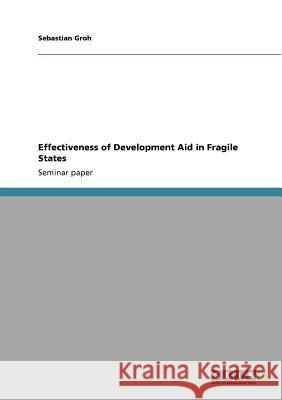Effectiveness of Development Aid in Fragile States » książka
Effectiveness of Development Aid in Fragile States
ISBN-13: 9783640557493 / Angielski / Miękka / 2010 / 72 str.
Seminar paper from the year 2009 in the subject Politics - Miscellaneous, grade: 1,3, University of Gottingen, course: Fragile States: Determinanten, Auswirkungen und mogliche Wege aus der Krise, language: English, abstract: What should we learn from our history of development aid? Development aid faces fundamental problems, especially in fragile states. These problems were addressed regularly by various representatives, academics, politicians and practitioners. The Samaritan Dilemma and a case study on used clothing is presented. It is clear that only having good intentions is not enough to help out the poor. The econometric analysis on aid effectiveness has repeatedly offered hope and repeatedly disappointed. There are several reasons why the aid flow increases anyway. Chauvet and Collier (2004) use a different approach and show potential for efficiency enhancements, but their analysis suffers from several caveats. Nevertheless, potential is shown and the authors indicate how to address the problem. Furthermore, the idea of social businesses is introduced as a market based mechanism which allows for feedback and accountability. Recent initiatives, primarily pushed by private actors, give reason for hope. It is on the governments to provide the basic conditions in the fragile states and to back those initiatives which so far show the best results.











